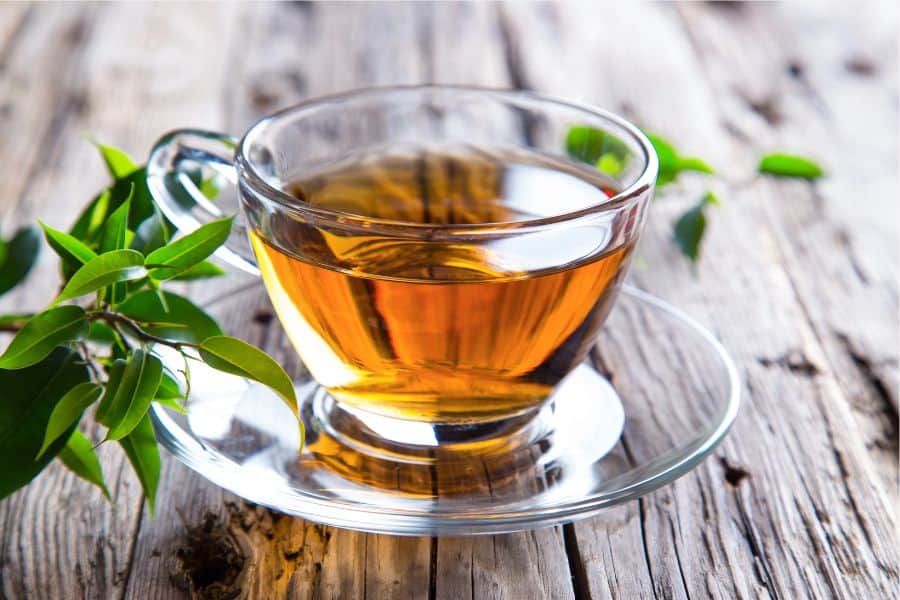Best Tea For Brain Health (Better Mental Function)
The number of people diagnosed with dementia is growing at an alarming rate. This is one brain-related symptom of concern, but there are many others. There is a growing importance to take as many preventative measures to maintain good mental health as possible, and drinking the best tea for brain health is an easy one to begin with.

There is a growing need for help when it comes to brain function. The brain is affected by what we consume, where we live, and our daily activities.
Many people do not think about cognitive health until problems arise. By taking steps now, certain health conditions can be avoided which lead to cognitive decline.
As I have mentioned in previous posts, my father was diagnosed with mild cognitive aphasia. This leads to severe aphasia and then dementia-like activity due to a lack of communicative understanding.
It is not to say that a simple herbal tea would have stopped this from happening. However, herbs have powerful proven benefits. Consuming cups of tea infused with the best herbs for brain health along with other preventative measures can keep mental clarity at its best.
What we do all works in conjunction together. For instance, certain herbal teas help the body relax which in turn helps with stress levels and impacts the brain. Other types of tea help the body detox toxins which affects brain activity. Therefore, trying an herbal-infused tea may impact you more than you know.

Best Teas for brain health
Green Tea
The first of teas that has brain benefits is green tea. A review of several studies has shown green tea positively impacts memory function and cognitive attention which is important for problem-solving and decision-making tasks.
Additionally, specific polyphenols found in green tea may potentially have neuroprotective qualities. However, this study was done on rats and further testing would confirm the extent of impact.
Green tea extract also possesses digestive benefits and eases stress levels. These qualities help the brain over time as well. Consuming green tea on a regular basis even further significantly impacts cognitive performance and maintains a healthy working brain.
Rosemary Tea
This herb is a common, fragrant herb used often in cooking. Researchers from Northumbria University have concluded that the element known as 1,8 cineole in rosemary appears to help with memory and neurotransmitter activity.
Additionally, rosemary has had beneficial effects on Alzheimer's Disease. It enhances cognitive ability and also has hepatoprotective effects. Hepatoprotective is the protection of liver health. When a liver is working correctly, it will eliminate toxins that can further damage brain health.
These attributes of rosemary make it a beneficial preventative herbal tea to consume regularly. Animal studies have shown the herb rosemary to improve cognitive function in animals with cognitive deficits. Therefore, the herb also holds promising effects of being used as a remedy for certain cognitive problems.
Oolong Tea
Oolong tea is a tea that falls between the green tea and black tea spectrum. It has antioxidants, vitamins, minerals, and amino acids that are helpful with mental clarity.
Studies show oolong to have promising effects with the amino acid GABA. This amino acid aids in slowing down an overactive nervous system. It relays information in the brain and spinal cord and can be beneficial for stress.
Lowering chronic stress levels and stabilizing the nervous system is important for brain health. Also, according to studies such as this, alpha brain waves showed improvement when drinking oolong tea . These are relaxed brain waves. These are vital to brain health and stress reduction.
Lemon Balm
Lemon balm is a herb used often in traditional medicine to help stabilize mood due to its calming effects. However, it also regulates better brain function. Studies have evaluated lemon balm as a water-based drink for these effects and have proven successful in doing so.
Similarly to the herb oolong, lemon balm may induce GABA levels in the brain. Once again, GABA is needed to decrease overstimulated brain neurons and relax the body.
According to Naturopath doctor Vera Martins, lemon balm has also been found to be helpful during all stages of menopause when anxiety, mood, and memory loss tend to be more prevalent due to low hormonal levels.
Lemon balm's calming effect may help some people with focus and word retrieval. When the body is calm, it is less likely to have overactivity of the neurotransmitter norepinephrine. This is helpful because when this neurotransmitter is too abundant, the brain has a difficult time focusing and recalling information.
Although lemon balm has been found to be helpful as a cup of tea, letting the tea bag steep long enough is important to get the medicinal effects. This herb is commonly taken in capsule and liquid form as well.
Ginseng Tea
Another great herb for the brain is Ginseng. Ginseng has been commonly advertised as an herbal remedy that has many health benefits for the brain. It also is a powerful herb for other diseases such as diabetes, arthritis, heart disease, osteoporosis, and more.
Ginseng's ability to target the hypothalamic–pituitary–adrenal axis allows it to benefit brain function. It also has powerful antioxidant properties that lower the body's state of inflammation. This is very important to maintain healthy cognitive function and prevent cognitive decline.
This may be considered the best tea for brain health due to these attributes. According to Alzheimer's Research and Therapy, Ginseng's benefits show that continued use of the herb for five years or longer has a greater likelihood of showing a greater impact on cognitive function as a person ages.
Additionally, other research provides significant evidence that Ginseng is a powerful preventative herb for the brain. This is due to its protective qualities.
Also, Ginseng is found to increase cognitive abilities. It can alter the brain and alleviate problems by changing the brain's elasticity.
Using Ginseng for better brain function and increased brain power is continually being researched. There are many promising studies on its potential. Using it as a preventative and proactive herb against brain disease is often recommended.
Matcha Tea
Another beneficial type of tea to drink to maintain a healthy brain is matcha tea. Matcha contains components that protect the brain. This study done on elderly woman using matcha green tea extract is one study of many that conclude this.
The components lutein, catechins such as L-Theanine, and vitamin K work in conjunction to provide protective brain benefits. Also, the ingredient caffeine in matcha is helpful. This is because the caffeine in matcha enhances the neuron effects of the antioxidant L-Theanine also present in matcha.
Additionally, the vitamin K and the carotenoid lutein are also beneficial elements that help with cognitive performance. Vitamin K aids memory ability in adults and lutein is shown to help with word recollection. These are important attributes for a healthy mind and brain.
Peppermint Tea
Peppermint tea is also a popular herb effective in brain health. It stimulates the brain and has been found to help with memory and improve learning. It also increases alertness. This helps with focus and clarity.
Both drinking peppermint in tea and smelling mint itself have beneficial effects on mental health. Therefore, peppermint tea's aroma and consumption can both be helpful at the same time.
White Tea
Lastly, white tea is one of the best teas to drink for brain health. White tea is made of young leaves and fresh shoots that are processed only slightly in comparison to other teas. This makes the tea higher in antioxidant properties.
Additionally, the polyphenol compound EGCG is in white tea. Much of this compound is broken down and absorbed by the gut microbiota. EGCG has potent antioxidant and anti-inflammatory properties important to brain health.
EGCG neutralizes free radicals and suppresses inflammation in the body. This protects brain cells and prevents them from being harmed or damaged. Therefore, mental clarity is preserved.
This post gives the best teas to drink for brain health and to prevent cognitive decline.
- https://www.alzint.org/about/dementia-facts-figures/dementia-statistics/#:~:text=Someone%20in%20the%20world%20develops,and%20139%20million%20in%202050.
- https://podcasts.ufhealth.org/rosemary-boosts-brain-power/
- Hussain, S. M., Syeda, A. F., Alshammari, M., Alnasser, S., Alenzi, N. D., Alanazi, S. T., & Nandakumar, K. (2022). Cognition enhancing effect of rosemary (Rosmarinus officinalis L.) in lab animal studies: a systematic review and meta-analysis. Brazilian journal of medical and biological research = Revista brasileira de pesquisas medicas e biologicas, 55, e11593. https://doi.org/10.1590/1414-431X2021e11593
- Hinton, T., Jelinek, H. F., Viengkhou, V., Johnston, G. A., & Matthews, S. (2019). Effect of GABA-Fortified Oolong Tea on Reducing Stress in a University Student Cohort. Frontiers in nutrition, 6, 27. https://doi.org/10.3389/fnut.2019.00027
- Scholey, A., Gibbs, A., Neale, C., Perry, N., Ossoukhova, A., Bilog, V., Kras, M., Scholz, C., Sass, M., & Buchwald-Werner, S. (2014). Anti-stress effects of lemon balm-containing foods. Nutrients, 6(11), 4805–4821. https://doi.org/10.3390/nu6114805
- Lee, S., & Rhee, D. K. (2017). Effects of ginseng on stress-related depression, anxiety, and the hypothalamic-pituitary-adrenal axis. Journal of ginseng research, 41(4), 589–594. https://doi.org/10.1016/j.jgr.2017.01.010
- Myoung-Sook Shin, YoungJoo Lee, Ik-Hyun Cho, Hyun-Jeong Yang,Brain plasticity and ginseng,
Journal of Ginseng Research,Volume 48, Issue 3,2024,Pages 286-297,ISSN 1226-8453,
https://doi.org/10.1016/j.jgr.2024.03.007. - Sakurai, K., Shen, C., Ezaki, Y., Inamura, N., Fukushima, Y., Masuoka, N., & Hisatsune, T. (2020). Effects of Matcha Green Tea Powder on Cognitive Functions of Community-Dwelling Elderly Individuals. Nutrients, 12(12), 3639. https://doi.org/10.3390/nu12123639
- Abiri, B., Amini, S., Hejazi, M., Hosseinpanah, F., Zarghi, A., Abbaspour, F., & Valizadeh, M. (2023). Tea's anti-obesity properties, cardiometabolic health-promoting potentials, bioactive compounds, and adverse effects: A review focusing on white and green teas. Food science & nutrition, 11(10), 5818–5836. https://doi.org/10.1002/fsn3.3595
More Posts To Enjoy
Adding an herbal tea bag to the juice of blueberries creates a powerful remedy for the immune system. What are these blueberry tea benefits? And why should you consider drinking a cup of blueberry tea
It is amazing the amount of functions that the liver performs. Taking care of it is vital. There is mixed information and data regarding the specific effects of a liver cleansing tea. This is because
Your body feeling sluggish? Supporting the lymphatic system with herbs is a powerful way to help your body begin the journey to feeling better. There are certain herbs that are great for lymphatic flow which
How is your memory? Ever feel like it could use a boost? Taking care of your brain can help with cognitive performance and help protect the brain against memory loss. These are things that tend
Having a hard time thinking of a gift to get someone with dementia or Alzheimer's? It can be tricky to know what to get and becomes a daunting task quickly. This list of gifts for
Bloating, gassy, crampy, or irritated often? Sick of looking like you are pregnant when you are not? This list will show you the best herbal tea for gut health. A better functioning digestion system will